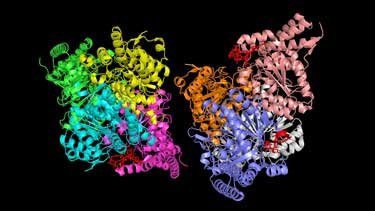Autoimmune Model Proposes Chronic Fatigue Syndrome (ME/CFS) Begins in the Gut
Jonas Blomberg's paper "Infection Elicited Autoimmunity and Myalgic Encephalomyelitis/Chronic Fatigue Syndrome: An Explanatory Model" was published in "Frontiers in Immunology", an apt journal for a paper featuring an "explanatory model" of chronic fatigue syndrome (ME/CFS). Autoimmunity is definitely a new "frontier"; as Blomberg points out, it's possibility not a reality yet, but like other frontiers it evokes new vistas - new opportunities and some new challenges. Blomberg has recently been immersed in a study designed to validate (or not) Dr. Scheibenbogen's autoantibody findings in chronic fatigue syndrome (ME/CFS). The lead role the Europeans are taking on in exploring autoimmunity in ME/CFS is evident: Blomberg and Gottfries are Swedish, Scheibenbogen is German, and Mella and Fluge - of the Rituximab trial - are Norwegian.(Carl-Gerhard Gottfries' story is so unusual that it warrants a short retelling. Gottfries, a Swedish psychiatrist, recovered from ME/CFS using, of all things, a staphylococcus vaccine. Gottfries opened an ME/CFS clinic, published his findings and treated patients with the vaccine for several decades until it was withdrawn from the market. Find out more about Gottfries' fascinating story here.)There are so many ideas floating around concerning the cause ME/CFS that one is tempted to throw up one's hands. Is cellular energy production in the dumps? Are the autonomic nervous system problems keeping people wired and exhausted at the same time? Is an autoimmune process pummeling the body? Are hidden infections tormenting ME/CFS patients with never ending flu-like symptoms? Or as Cortene suggests, are problems in the HPA axis wreaking havoc on the rest of the body.We could go on and on (ion channel dysfunction (Griffiths University); whacked out basal ganglia (Miller/Japanese); microbiome dysregulation (Lipkin & Hornig, Unutmaz, Lombardi), "traveling genes" (RCCX - Meglathery); atypical sepsis (Bell); neuroinflammation (Younger), (mast cell activation in the hypothalamus - Theoharides. ).The fact that so many people have proposed so many interesting hypotheses is encouraging, but the downside to such a munificence of possibilities is a kind of inertia. Until the ME/CFS field settles on one or a few models of disease, this small field is inevitably going to progress more slowly that we would wish.In fact, the two Davises at Stanford (Ron and Mark - not related) have questioned whether the field should devote time and money to chasing down hypotheses at all. Better, they have suggested, to gather more and more data and see what emerges. That said, something has been emerging - an explanatory model in which autoimmunity plays a key role.
Blomberg has recently been immersed in a study designed to validate (or not) Dr. Scheibenbogen's autoantibody findings in chronic fatigue syndrome (ME/CFS). The lead role the Europeans are taking on in exploring autoimmunity in ME/CFS is evident: Blomberg and Gottfries are Swedish, Scheibenbogen is German, and Mella and Fluge - of the Rituximab trial - are Norwegian.(Carl-Gerhard Gottfries' story is so unusual that it warrants a short retelling. Gottfries, a Swedish psychiatrist, recovered from ME/CFS using, of all things, a staphylococcus vaccine. Gottfries opened an ME/CFS clinic, published his findings and treated patients with the vaccine for several decades until it was withdrawn from the market. Find out more about Gottfries' fascinating story here.)There are so many ideas floating around concerning the cause ME/CFS that one is tempted to throw up one's hands. Is cellular energy production in the dumps? Are the autonomic nervous system problems keeping people wired and exhausted at the same time? Is an autoimmune process pummeling the body? Are hidden infections tormenting ME/CFS patients with never ending flu-like symptoms? Or as Cortene suggests, are problems in the HPA axis wreaking havoc on the rest of the body.We could go on and on (ion channel dysfunction (Griffiths University); whacked out basal ganglia (Miller/Japanese); microbiome dysregulation (Lipkin & Hornig, Unutmaz, Lombardi), "traveling genes" (RCCX - Meglathery); atypical sepsis (Bell); neuroinflammation (Younger), (mast cell activation in the hypothalamus - Theoharides. ).The fact that so many people have proposed so many interesting hypotheses is encouraging, but the downside to such a munificence of possibilities is a kind of inertia. Until the ME/CFS field settles on one or a few models of disease, this small field is inevitably going to progress more slowly that we would wish.In fact, the two Davises at Stanford (Ron and Mark - not related) have questioned whether the field should devote time and money to chasing down hypotheses at all. Better, they have suggested, to gather more and more data and see what emerges. That said, something has been emerging - an explanatory model in which autoimmunity plays a key role.
An Autoimmune Model of Chronic Fatigue Syndrome
Basically, the authors propose that it all starts with your genes and your leaky gut. Not the leaky gut you necessarily associate with ME/CFS but the leaky gut you had before, perhaps long before you came down with ME/CFS.
A Genetic Predisposition
Autoimmune diseases typically feature a strong genetic component and run in families. It's not that rheumatoid arthritis shows up in family member after family member. It’s that a range of other autoimmune diseases do. Blomberg picks out three intriguing autoimmune diseases - thyroid disease, Sjogren's Syndrome (SS) and lupus - which studies suggest run in ME/CFS families. ME/CFS itself is also associated with diseases Blomberg considers to be emerging autoimmune diseases including hypothyroidism, fibromyalgia and POTS, each of which has been associated with increased levels of autoantibodies. Blomberg clearly believes an autoimmune cluster containing many of the diseases associated with ME/CFS is emerging before our eyes.High rates of two of those diseases (thyroid, SS) also recently showed up in a postural orthostatic tachycardia syndrome (POTS) study (along with antiphospholipid syndrome).Blomberg then ploughed through genetic, immune and epigenetic data in ME/CFS, highlighting some findings suggesting autoimmunity might be present.For instance, autoimmune diseases often occur when HLA molecules improperly display self-antigens to cytotoxic or helper T-cells. T-cells, it turns out, are often huge drivers of autoimmunity, and when they produce autoimmunity, HLA issues are often prominent. Guess what: an HLA issue has been found in ME/CFS. (Ron Davis is studying HLA genes in ME/CFS.) Another study found that increased prevalence of genetic alteration (a SNP) in a T-cell receptor gene known to play a role in autoimmunity suggested that a T-cell based autoimmune process could be present.
ME/CFS itself is also associated with diseases Blomberg considers to be emerging autoimmune diseases including hypothyroidism, fibromyalgia and POTS, each of which has been associated with increased levels of autoantibodies. Blomberg clearly believes an autoimmune cluster containing many of the diseases associated with ME/CFS is emerging before our eyes.High rates of two of those diseases (thyroid, SS) also recently showed up in a postural orthostatic tachycardia syndrome (POTS) study (along with antiphospholipid syndrome).Blomberg then ploughed through genetic, immune and epigenetic data in ME/CFS, highlighting some findings suggesting autoimmunity might be present.For instance, autoimmune diseases often occur when HLA molecules improperly display self-antigens to cytotoxic or helper T-cells. T-cells, it turns out, are often huge drivers of autoimmunity, and when they produce autoimmunity, HLA issues are often prominent. Guess what: an HLA issue has been found in ME/CFS. (Ron Davis is studying HLA genes in ME/CFS.) Another study found that increased prevalence of genetic alteration (a SNP) in a T-cell receptor gene known to play a role in autoimmunity suggested that a T-cell based autoimmune process could be present.
Infections, EBV, Autoimmunity and ME/CFS
Infections often trigger autoimmunity. In fact, the infectious trigger that has sparked ME/CFS for many is one big clue that an autoimmune process may be present. With regard to autoimmunity, the more severe the infection, the better, and several studies show that deficiencies in IgG subclasses may have left people with ME/CFS more vulnerable to a severe infection.Several gene expression studies showing alterations in T-cell and innate immune response genes suggested that ME/CFS patients’ immune systems could be fighting off an infection.
The Autoimmune Virus
EBV is especially interesting as a facilitator of autoreactivity. Blomberg et. al.
If you're unlucky enough to first meet up with the Epstein-Barr virus (a common trigger of ME/CFS) during adolescence, it's likely to trigger your immune system to produce a massive number of antibodies, including autoantibodies. EBV also produces antigens with highly repetitive structures (e.g., Gly–Ala–Gly–Ala repeats in EBNA1) which tend to confuse the immune system and trigger the production of autoantibodies.It's no wonder, then, that infectious mononucleosis (glandular fever) significantly increases the risk of later coming down with at least two autoimmune diseases: multiple sclerosis (MS) and lupus. That's an interesting enough intersection for Blomberg to assert that the immune responses that ME/CFS, MS and lupus have to EBV should be compared.
The Key Organ - the Gut
Anyone have gut symptoms (cramping, bloating, loose bowels, constipation) prior to ME/CFS? I did - they weren't major, but if one area of my body was a little bit off back then, it was my gut.Blomberg believes your leaky gut may be the key to your illness. Not the leaky gut you necessarily have now, but the leaky gut you had before you got ME/CFS. The gut is such a potential hotspot for autoimmunity because it contains so much foreign material. In fact the gut has been posited as something of a training ground for the immune system- it provides the immune system with the foreign materials it needs to learn how to distinguish self from non-self.Gut disturbances are fairly common in autoimmune diseases, and the idea that alterations in gut flora are touching off autoimmune processes is being examined in a host of autoimmune diseases (multiple sclerosis, type 1 diabetes, RA, ankylosing spondylitis). The common occurrence of irritable bowel syndrome (IBS) - and the leaky gut that often comes with it - in ME/CFS presents a potential pathway for autoimmunity.Blomberg proposes that the breach of your gut barrier created a state of low level chronic inflammation prior to you getting ME/CFS. The gut barrier is important because it's a place in the body where tolerance (the ability to distinguish between self and non-self antigens) is more difficult to maintain. Given the extraordinary diversity and sheer number of gut bacteria, it's easy to see how the immune system could be overwhelmed and lose it's way.Blomberg believes that slow leakage from the gut created a population of auto-reactive B-cells that remained mostly inactive or quiescent (in a state of anergy), almost like undercover agents infiltrating a city, waiting for the signal to pounce. At some point a "decisive" immune event flipped them into action, and an autoimmune disease - ME/CFS - was born.He bases his hypothesis of pathogenic autoantibody creation in ME/CFS on a process that appears to be occurring in lupus. The first step occurs when a genetically predisposed person meets up with bad gut bacteria. First, abnormal but not pathogenic B-cells, which have a "weak autospecificity", appear. These weakly targeted B-cells are not strongly directed against a specific antigen or part of the cell and don't appear to be particularly dangerous at first, but the body should still eliminate them. Blomberg proposes that it doesn't.Over time exposure to the bad gut bacteria causes the specificity of the B-cells to change - making them more targeted and dangerous. At some point an infection turns them on and they start producing clones of themselves which begin attacking the body. ME/CFS is born.One possible sign that tolerance - the ability of the body to remove autoantibody-producing cells - has been breached in ME/CFS are the TFG-B (and IL-10) findings. IL-10 and TGF-B, in particular, are the rare cytokines that are more or less consistently found dysregulated in ME/CFS cytokine studies. It turns out that T-helper cells use both these cytokines to regulate tolerance and anergy at the gut mucosa - the very place Blomberg believes the process of autoimmunity in ME/CFS begins.Ian Lipkin's recent study found a significant difference in gut composition between ME/CFS patients with IBS and those without. Some of those differences appeared to affect energy production.
The gut is such a potential hotspot for autoimmunity because it contains so much foreign material. In fact the gut has been posited as something of a training ground for the immune system- it provides the immune system with the foreign materials it needs to learn how to distinguish self from non-self.Gut disturbances are fairly common in autoimmune diseases, and the idea that alterations in gut flora are touching off autoimmune processes is being examined in a host of autoimmune diseases (multiple sclerosis, type 1 diabetes, RA, ankylosing spondylitis). The common occurrence of irritable bowel syndrome (IBS) - and the leaky gut that often comes with it - in ME/CFS presents a potential pathway for autoimmunity.Blomberg proposes that the breach of your gut barrier created a state of low level chronic inflammation prior to you getting ME/CFS. The gut barrier is important because it's a place in the body where tolerance (the ability to distinguish between self and non-self antigens) is more difficult to maintain. Given the extraordinary diversity and sheer number of gut bacteria, it's easy to see how the immune system could be overwhelmed and lose it's way.Blomberg believes that slow leakage from the gut created a population of auto-reactive B-cells that remained mostly inactive or quiescent (in a state of anergy), almost like undercover agents infiltrating a city, waiting for the signal to pounce. At some point a "decisive" immune event flipped them into action, and an autoimmune disease - ME/CFS - was born.He bases his hypothesis of pathogenic autoantibody creation in ME/CFS on a process that appears to be occurring in lupus. The first step occurs when a genetically predisposed person meets up with bad gut bacteria. First, abnormal but not pathogenic B-cells, which have a "weak autospecificity", appear. These weakly targeted B-cells are not strongly directed against a specific antigen or part of the cell and don't appear to be particularly dangerous at first, but the body should still eliminate them. Blomberg proposes that it doesn't.Over time exposure to the bad gut bacteria causes the specificity of the B-cells to change - making them more targeted and dangerous. At some point an infection turns them on and they start producing clones of themselves which begin attacking the body. ME/CFS is born.One possible sign that tolerance - the ability of the body to remove autoantibody-producing cells - has been breached in ME/CFS are the TFG-B (and IL-10) findings. IL-10 and TGF-B, in particular, are the rare cytokines that are more or less consistently found dysregulated in ME/CFS cytokine studies. It turns out that T-helper cells use both these cytokines to regulate tolerance and anergy at the gut mucosa - the very place Blomberg believes the process of autoimmunity in ME/CFS begins.Ian Lipkin's recent study found a significant difference in gut composition between ME/CFS patients with IBS and those without. Some of those differences appeared to affect energy production.
Autoantibodies
It turns out that autoantibodies by themselves are not necessarily indicative of autoimmunity. Some "natural autoantibodies – (mostly IgM antibodies) are simply designed to rid the body of dead/apoptotic, damaged and infected cells and rarely cause autoimmune diseases. Other more dangerous autoantibodies need to be turned on by "cell danger" signals before they do harm. (This is why autoantibodies can often be found in healthy people.)Autoantibodies have, of course, been found in ME/CFS and related diseases like POTS. At the Montreal conference Blomberg reported that his team was validating Scheibenbogen's autoantibody findings in ME/CFS. They are one clue that autoimmunity is happening in ME/CFS but they provide, Blomberg reported, only circumstantial evidence of autoimmunity.It's the "erroneously activated" B-cells, he reported, that are "the root of the evil", and it's these cells that need more focus. Blomberg asserts that an in-depth sequencing of these deranged B-cells is needed. By sequencing the variable immunoglobulin chains found in them it should be possible to trace back to how they turned bad.
Other Possible Evidence of Autoimmunity
As noted earlier, Carl-Gerhard Gottfries successfully used a staphylococcal vaccine for years to treat himself and others with chronic fatigue syndrome (ME/CFS). That approach may have worked because the immune stimulation it provoked may have been able to induce tolerance; i.e. induce the body to remove the bad B-cells.Since Rituximab knocks down B-cells, thereby removing misbehaving ones, it would seem to fit into Blomberg's hypothesis. Unfortunately, the Rituximab trial failed, and if anecdotal reports are correct, more completely than we could have imagined.Another possible indication that autoimmunity is present in ME/CFS are studies suggesting the incidence of Hodgkin's lymphoma is increased in ME/CFS as it is in other autoimmune diseases.In the end, though, Blomberg reports that the evidence that autoimmunity is at work in ME/CFS is circumstantial. It relies on the fact that people with ME/CFS often have other autoimmune diseases such as thyroiditis or diseases suspected of involving autoimmunity such as POTS, FM and IBS, that autoantibodies are present, and that immunostimulation (IVIG, staphyloccocus vaccine) may work.Most of the work, though, needed to fulfill the Witebsky–Rose criteria for autoimmunity, remains to be done.
Primary Biliary Cirrhosis - An Autoimmune Roadmap for Chronic Fatigue Syndrome (ME/CFS)?
At the start of their paper, Blomberg et. al. proposed that their model could explain many of the facets of ME/CFS that have emerged - the most prominent of which are the energy production problems.An autoimmune disease exists in which an attack on the energy producing processes in the body produces symptoms and findings similar to those found in ME/CFS. In primary biliary cirrhosis (PBC) antibodies attack a small fatty acid molecule (lipoic acid) that's part of the energy producing machinery on the surface of the mitochondria. The antibodies in PBC attack the pyruvate dehydrogenase (PDH) enzyme complex which regulates the transition from glycolysis (anaerobic energy metabolism) to the tricarboxylic acid cycle (aerobic energy metabolism). The same issue -the transition from glycolysis to aerobic metabolism - has shown up repeatedly in ME/CFS studies.Even though PBC is considered a liver disease, it produces enormous amounts of fatigue as well as cognitive problems, orthostatic intolerance and sympathetic nervous system hyperactivity. In fact, Julia Newton, who studied PBC before she studied ME/CFS and started a Rituximab trial in PBC two years ago, stated back in 2013 that,
The antibodies in PBC attack the pyruvate dehydrogenase (PDH) enzyme complex which regulates the transition from glycolysis (anaerobic energy metabolism) to the tricarboxylic acid cycle (aerobic energy metabolism). The same issue -the transition from glycolysis to aerobic metabolism - has shown up repeatedly in ME/CFS studies.Even though PBC is considered a liver disease, it produces enormous amounts of fatigue as well as cognitive problems, orthostatic intolerance and sympathetic nervous system hyperactivity. In fact, Julia Newton, who studied PBC before she studied ME/CFS and started a Rituximab trial in PBC two years ago, stated back in 2013 that,
"…at this stage the muscle and cardiac abnormalities that we have seen in patients with ME/CFS are exactly the same as those that we have seen in patients with PBC."
Another fascinating aspect of PBC is that the autoantibodies are attacking a molecule, lipoic acid, which is added to the PDH enzyme using a rare process called lipoylation. Because some gut bacteria (Novosphingobium) also use lipoylation, it's possible that bacterial leakage initiated the autoimmune process causing PBC.Blomberg suggested that pathogenic, as yet unidentified immunoglobulins directed against mitochondrial proteins could be the source of ME/CFS and exhorted researchers to compare the post-exertional malaise in ME/CFS to other diseases such as fibromyalgia, PBC, etc.
Autoimmunity or Oxidative Stress?
Finally Blomberg et. al. suggested that oxidative stress could be producing the same energy depleting issues as autoimmunity. That's an intriguing idea given the comforting consistency oxidative stress study results have had in ME/CFS. The authors noted that it was recently shown that the oxidation of a critical part of the pyruvate kinase enzyme can effectively block the transition of glycolysis to aerobic metabolism.Dr. Shungu believes the lactate accumulations and glutathione reductions his studies have validated in the ventricles of the brains of ME/CFS patients are associated with oxidative stress.
Conclusion
Blomberg's autoimmune model proposes that the seeds for ME/CFS were lain possibly long before the disease appeared and only "sprouted" once a decisive immune event occurred. He believes that a genetic predisposition plus a leaky gut laid the groundwork over time for what eventually became an autoimmune disease.Autoantibodies provide circumstantial evidence of autoimmunity in ME/CFS but are not nearly enough to validate it. Blomberg asserted that an intensive study of the abnormal B-cells in ME/CFS could both help to validate that diagnosis and identify the precipitating event which triggered this illness.If ME/CFS is an autoimmune disease targeting the mitochondria it may have a close cousin called primary biliary cirrhosis (PBC) which produces similar symptoms including enormous fatigue. In PBC autoantibodies disrupt the transition from anaerobic to aerobic energy production - the same process, interestingly enough, that appears to be affected in ME/CFS.While autoimmune processes could produce the energy problems in ME/CFS, oxidative stress - which studies have found to be consistently high in this disease - could produce the same result.
